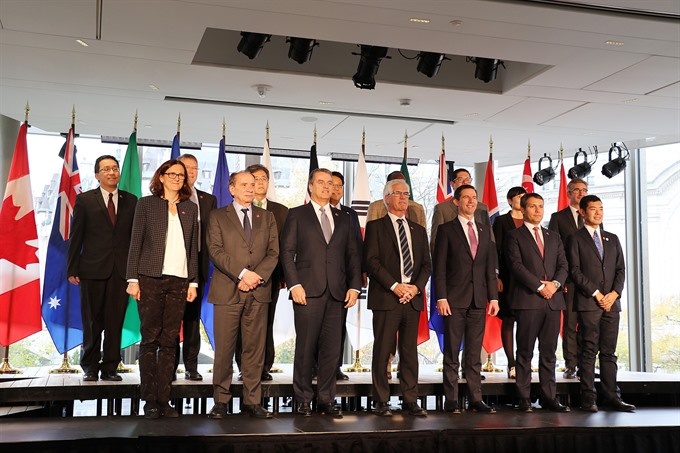 World
World

An overhaul of global trade is urgently needed, 13 trade ministers representing all regions of the world said on Thursday, following two days of talks in Ottawa aimed at setting objectives to reform the troubled system. The group made a veiled appeal to the United States to stop blocking appointments to WTO dispute resolution panels, warning the system will otherwise collapse soon.
 |
| Group photo of participants at the event. — VNA/VNS Photo Quang Thịnh |
OTTAWA — An overhaul of global trade is urgently needed, 13 trade ministers representing all regions of the world said on Thursday, following two days of talks in Ottawa aimed at setting objectives to reform the troubled system.
The group made a veiled appeal to the United States to stop blocking appointments to WTO dispute resolution panels, warning the system will otherwise collapse soon.
Leaders also said a rethink is needed on the differential treatment of developing nations, in an apparent nod to US complaints that China is considered a developing nation, despite its economic might.
Canada hosted officials from Australia, Brazil, Chile, the European Union, Japan, South Korea, Kenya, Mexico, New Zealand, Norway, Singapore, and Switzerland for the talks.
The United States and China, however, were not at the table.
"The current situation at the WTO is no longer sustainable and action must be taken," Canada’s Trade Minister Jim Carr told a closing press conference.
"We share (the US) appetite for reform," he added. "It is in need of renewal... It’s time for this reform and this is a good place to start."
The failure to adjust global trade rules in the last two decades -- particularly in agriculture and services -- has undermined the potential to boost growth and reduce poverty, according to a joint report by the
International Monetary Fund, World Trade Organisation and World Bank released September 30.
The organisations are urging redoubled efforts to accelerate reforms, especially to the WTO -- moves they say are aimed at salvaging the economic benefits of trade and ensuring that prosperity is shared more widely.
US President Donald Trump’s relentless attacks on the Geneva-based WTO and threats to pull his country out of the global trade body added urgency to the discussions.
His "America First" policy and use of punitive tariffs have unsettled trade relations.
WTO Director General Roberto Azevedo, who joined the talks, has said he agrees that the WTO needs reforms, and soon.
Carr meanwhile acknowledged that there can be no substantive reforms without the US or China.
But he also stressed the need to frame rules for all 164 WTO member nations.
"We are a relatively small country and our major trading partners are big," Carr said as the meetings began.
"Rules matter because we each merit the protections they afford and the opportunity they create for even the smallest first-time exporter in the most far-flung corner of the world to compete and to succeed," he said.
"To make that kind of relationship work, we have to believe the rules of trade work for all of us and our people have to see that, too."
Among the objectives outlined at the Ottawa ministerial were safeguarding the WTO dispute settlement system, improving its "monitoring and transparency functions," and adjusting rules to reflect the dominance in trade of services, including ecommerce.
In a joint communique, the delegates said they are "deeply concerned by recent developments in international trade, particularly the rise in protectionism, which negatively affect the WTO and put the entire multilateral trading system at risk."
They said "continued vacancies in the Appellate Body present a risk to the WTO system as a whole" and "emphasized an urgent need to unblock the appointment of Appellate Body members."
At the same time, the delegates acknowledged concerns about its functioning and vowed to "work on solutions."
The Appellate Body normally has seven members, but is now down to three.
If one more is lost, the dispute resolution system will stop functioning, putting trade disputes in limbo.
The Ottawa group also said trading rules must be updated "to reflect 21st century realities" and the WTO must "explore how the development dimension, including special and differential treatment, can be best pursued in rule-making efforts."
They refused to cast it aside, however, saying "development must remain an integral part of our work."
Another meeting of the Canadian-led group is scheduled for January. — AFP




